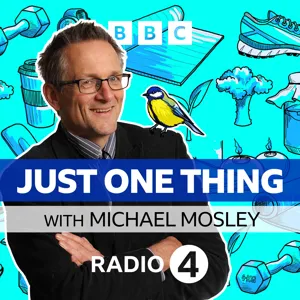Podcast Summary
Exploring solutions for health, finance, and personal growth: Discover online doctors for weight loss, affordable wireless service, and guided meditation podcasts to improve health, finances, and mental peace
There are various ways to improve different aspects of your life, whether it's losing weight, saving money, or finding inner peace. PlushCare offers online access to board-certified physicians who can help you start a weight loss journey with FDA-approved medications. Mint Mobile, on the other hand, is cutting its prices to make wireless service more affordable. In the realm of mental well-being, the Deep Calm podcast by Michael Mosley provides guided sessions to help listeners activate their relaxation response and find inner peace. These examples demonstrate that there are solutions and resources available for those seeking change, whether it's related to health, finance, or personal growth. So, take charge of your life, explore your options, and discover the tools that can help you make a positive impact.
Imagining peaceful scenes can trigger a relaxation response: Imagining peaceful scenes for 20 minutes can impact brainwaves, lower heart rate, blood pressure, clear mind, lift mood, reduce stress hormones, and help cope with pain and insomnia.
Guided imagery, a practice of using your imagination to create peaceful scenes and scenarios, can trigger a relaxation response in your body. This response, governed by your parasympathetic nervous system, can lead to a cascade of chemical changes, lowering heart rate and blood pressure, clearing your mind, lifting your mood, reducing stress hormones, and even helping to cope with pain and insomnia. A study conducted by Katarzyna Zembla and her team at SWPS University in Warsaw found that practicing guided imagery for just 20 minutes can impact brainwaves, indicating a real connection between the mind and body. By focusing on peaceful images, smells, and scenarios, you can detach from stressful thoughts and activate your body's natural relaxation response.
Using imagination to relax and focus: Imagination techniques like guided imagery can lead to deep relaxation, focus, and improved concentration by shifting brainwaves to alpha state. Short daily sessions can provide benefits with minimal training.
Guided imagery, a relaxation technique, can significantly alter brainwave patterns towards a more relaxed and creative state. During a study, researchers observed a shift from beta brainwaves to alpha brainwaves in participants who underwent guided imagery. Alpha waves indicate deep relaxation and focus, leading to improved concentration and fewer mistakes. Katarzyna's research suggests that engaging your imagination in this way requires minimal training and can provide immediate benefits. You don't need to create new scenarios each time; returning to a familiar, comforting imagined setting can deepen the relaxation response. Guided imagery sessions can be found online or recorded personally, and even just 15 minutes a day can make a difference. To enhance the experience, consider practicing progressive muscle relaxation beforehand. Try it out for yourself and explore the calming effects on both body and mind.
Using your imagination to create a calming mental image: Engaging your imagination to visualize a peaceful place triggers physiological changes, reduces stress, and promotes relaxation
Using guided imagery, or the power of your imagination, can have profound effects on both your mind and body. This process involves visualizing a peaceful place, which triggers signals in your brain that retrieve memories and information, and then transmit them to the visual cortex for interpretation. This is known as your mind's eye. When you fully engage in this imaginative experience, it can lead to physiological changes such as dilating or contracting pupils, distinct patterns of electrical activity in the brain, and a reduction in stress responses. By creating a calming mental image, you can engage your relaxation response, which can slow your heart rate, calm your mind, and enable your body to renew and repair. This is a simple yet powerful tool for reducing stress and promoting relaxation.

